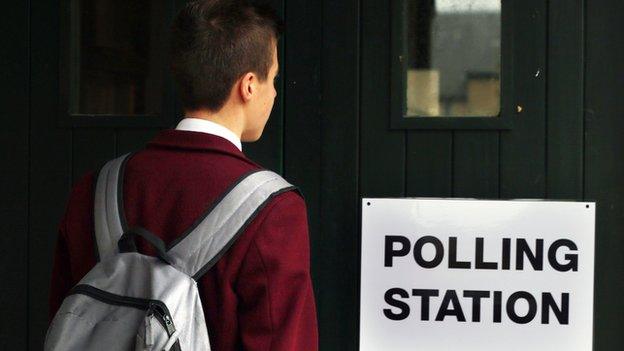House of Lords raises voting age concerns
- Published

The Scottish referendum allowed 16 and 17-year-olds to vote for the first time
A House of Lords committee has criticised the plan to transfer power from Westminster to Holyrood to enable 16 and 17-year-olds to vote.
The proposal has the backing of all the political parties involved in the Smith Commission.
But the House of Lords Constitution Committee said it had concerns about the way the process was being handled and the impact in the rest of the UK.
The criticism was dismissed by both the UK and Scottish governments.
The UK government said the proposal to give votes to 16 and 17 year olds at Holyrood elections would be fully scrutinised by the Scottish Parliament.
And the SNP - which forms the administration at Holyrood - said it was "utter hypocrisy" for unelected peers to "put roadblocks in the way of Scotland's young adults being given the vote".
The voting age was reduced to 16 for the Scottish independence referendum in September.
Fast-tracked
During the Smith Commission negotiations on further devolution to Scotland, it was agreed to transfer legislative power from the UK parliament to Holyrood to allow 16 and 17 year olds to vote in future Scottish Parliament elections.
This power was being fast-tracked ahead of other Smith proposals so that it could be implemented in time for the 2016 Holyrood elections.
Both MSPs at Holyrood and MPs at Westminster have already backed the Section 30 order and it was expected the amendment to the 1998 Scotland Act would be approved in the House of Lords on Thursday.
But the report by the Constitution Committee - which is chaired by former Conservative Scottish Secretary Lord Lang - said proper parliamentary scrutiny was lacking.
It also raised concerns about data protection for teenagers on the electoral register and claimed the move - for local elections as well as the Holyrood elections - went beyond the Smith commission's proposals.
The report said: "The changes do not directly affect the franchise for UK general elections, European Parliamentary elections, or local government elections beyond Scotland, and therefore the order has no immediate constitutional implications for the rest of the UK.
"However, it seems likely that the Scottish Parliament will legislate for a reduction in the voting age for all future Scottish Parliament and Scottish local government elections and this may lead to pressure for similar changes to the franchise in the other devolved territories."
The "potentially piecemeal and incremental approach" contrasts sharply to the two commissions which took evidence before the voting age was lowered to 18 in the 1960s, as well as the process in the Republic of Ireland, where proposals to allow votes at 16 were studied by a Constitutional Convention and must obtain public approval in a referendum to become law.
"A voting age of 16 remains very uncommon around the world, and is not a change which any of the UK's main European neighbours has adopted. Nor is it known to be UK government policy that the voting age should be lowered," said the report.
"The House may wish to consider whether sufficient consideration has been given to the effect of this proposal on the United Kingdom constitution as a whole."
The UK government denied the committee's claims.
'Considered in detail'
A spokesman said: "The main point to make here is that the proposal to give votes to 16 and 17 year olds at Holyrood elections will receive proper scrutiny - by the Scottish Parliament.
"A bill will need to go through the Scottish Parliament on this matter before it becomes law. It will be considered in detail by MSPs.
"The UK parliament is being asked to consider whether to give the Scottish Parliament the power to be able to do this. The 1998 Scotland Act allows for powers to be transferred to Holyrood and the Section 30 route is the way that this is done."
He added: "The Section 30 route was approved by the UK Parliament when it passed the 1998 Scotland Act so it is wrong to say that it is not the appropriate way to proceed on this issue."
SNP MSP Christina McKelvie said: "The fact a Tory former Scottish Secretary and a group of unelected peers want to put roadblocks in the way of Scotland's young adults being given the vote speaks volumes - it is utter hypocrisy and shows how out of touch Lord Lang and his House of Lords colleagues are.
"The involvement of 16 and 17 year-olds in the independence referendum was a huge success and contributed massively to the democratic engagement Scotland witnessed.
"These unelected peers believe that giving young adults the vote in Scotland will 'lead to pressure' for it to be extended to 16 and 17 year-olds in other parts of the UK - they are quite right, but that is something to be welcomed, not condemned."
The voting age for the UK general election in May will remain at 18 and over, as this is Âcontrolled by Westminster.